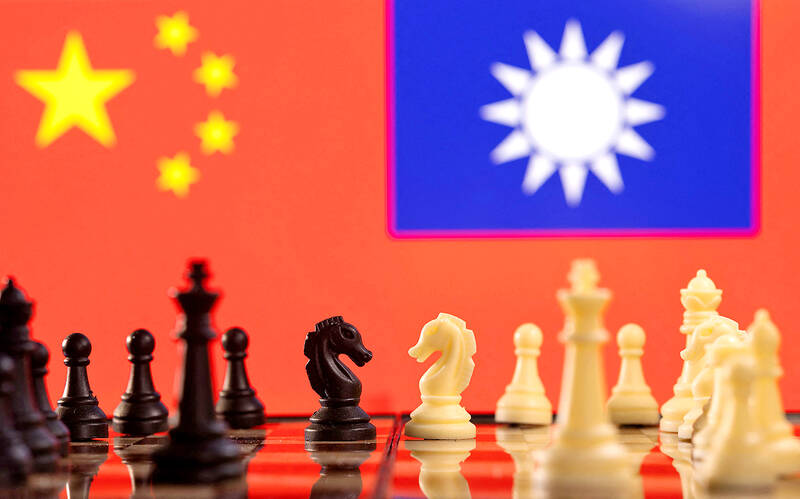Beijing is stepping up efforts to convince countries to adopt its view that Taiwan is an inseparable part of China, which might provide a legal basis for it to invade the island, the London-based magazine The Economist said on Thursday.
Nearly a month into the new year, “a new diplomatic battle is intensifying that risks setting the stage for war,” the magazine said, citing incidents of Nauru switching diplomatic ties from Taipei to Beijing on Monday last week and the US Navy sending a warship through the Taiwan Strait on Wednesday.
Beijing has “opened up a novel front” in its diplomatic campaign — the Chinese Communist Party “wants not only to be the sole representative of China, it also wants countries to adopt its view that Taiwan is an alienable part of it,” it said.

Photo: Reuters
If the campaign is successful, Chinese leaders would gain considerable diplomatic clout and “a legal basis for invading the island,” it said, warning that the risk for Taiwan is beyond the languages taken by foreign countries, but military actions.
Among the 183 countries, including Nauru, that now formally recognize China, huge differences exist in their attitudes toward Taiwan, it said.
At opposite ends of the spectrum are countries that treat Taiwan as a de facto independent country without formally recognizing it and those that endorse China’s claim, it said.
Statements made by the Chinese Ministry of Foreign Affairs last year said that at least 28 countries have supported China’s ambition to “unify” with Taiwan, it said.
Chinese officials are striving to enlist such support from more countries as they believe that it “helps China make the case that unification is justified, by force if necessary,” it said.
Most Western countries take a pro-Taiwan stance and “are moving further in that direction” while maintaining their own versions of the “one China” policy, it said.
The US is showing signs of making less ambiguous statements about its support for Taiwan and engaging in higher-level interactions with Taiwanese counterparts while encouraging its allies to do the same, it said.
“China has therefore focused its efforts [and economic pressure] on the developing world,” promoting its views in multilateral organizations, it said.
Beijing misinterprets the UN Resolution 2758 by claiming that Taiwan is an inseparable part of China’s territory, and with some success, as Nauru cited the misinterpretation as the reason it severed ties with Taiwan, it said.
The resolution, which was adopted by the UN 26th General Assembly in 1971 to resolve the issue of China’s representation at the UN, recognizes the People’s Republic of China as the “only lawful representative of China,” but does not mention Taiwan or state that “Taiwan is part of the PRC,” as China claims.

Chinese spouse and influencer Guan Guan’s (關關) residency permit has been revoked for repeatedly posting pro-China videos that threaten national security, the National Immigration Agency confirmed today. Guan Guan has said many controversial statements in her videos posted to Douyin (抖音), including “the red flag will soon be painted all over Taiwan” and “Taiwan is an inseparable part of China,” and expressing hope for expedited reunification. The agency last year received multiple reports alleging that Guan Guan had advocated for armed reunification. After verifying the reports, the agency last month issued a notice requiring her to appear and explain her actions. Guan

A preclearance service to facilitate entry for people traveling to select airports in Japan would be available from Thursday next week to Feb. 25 at Taiwan Taoyuan International Airport, Taoyuan International Airport Corp (TIAC) said on Tuesday. The service was first made available to Taiwanese travelers throughout the winter vacation of 2024 and during the Lunar New Year holiday. In addition to flights to the Japanese cities of Hakodate, Asahikawa, Akita, Sendai, Niigata, Okayama, Takamatsu, Kumamoto and Kagoshima, the service would be available to travelers to Kobe and Oita. The service can be accessed by passengers of 15 flight routes operated by

GIVE AND TAKE: Blood demand continues to rise each year, while fewer young donors are available due to the nation’s falling birthrate, a doctor said Blood donors can redeem points earned from donations to obtain limited edition Formosan black bear travel mugs, the Kaohsiung Blood Center said yesterday, as it announced a goal of stocking 20,000 units of blood prior to the Lunar New Year. The last month of the lunar year is National Blood Donation Month, when local centers seek to stockpile blood for use during the Lunar New Year holiday. The blood demand in southern Taiwan — including Tainan and Kaohsiung, as well as Chiayi, Pingtung, Penghu and Taitung counties — is about 2,000 units per day, the center said. The donation campaign aims to boost

The Central Weather Administration (CWA) said a magnitude 4.9 earthquake that struck off the coast of eastern Taiwan yesterday was an independent event and part of a stress-adjustment process. The earthquake occurred at 4:47pm, with its epicenter at sea about 45.4km south of Yilan County Hall at a depth of 5.9km, the CWA said. The quake's intensity, which gauges the actual effects of a temblor, was highest in several townships in Yilan and neighboring Hualien County, where it measured 4 on Taiwan's seven-tier intensity scale, the CWA said. Lin Po-yu (林柏佑), a division chief at the CWA's Seismological Center, told a news conference